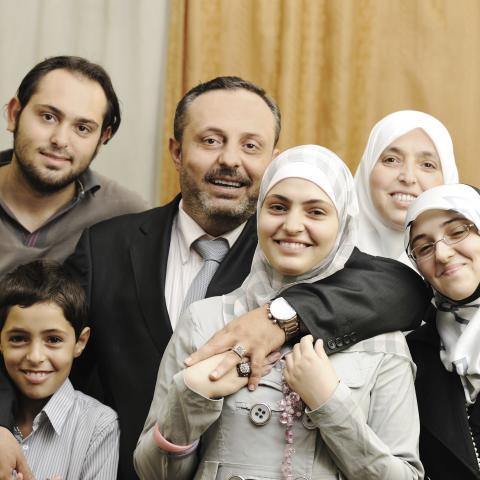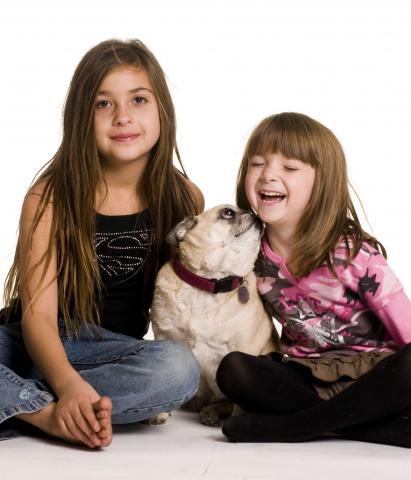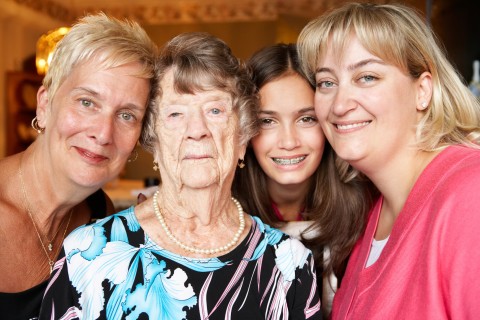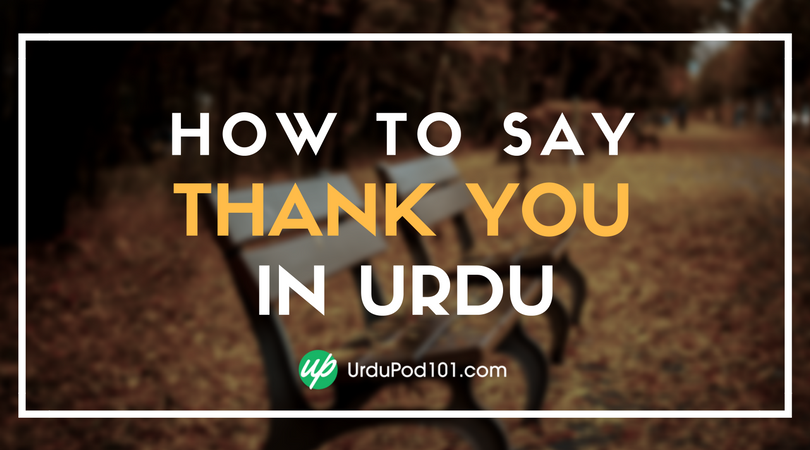
Family is one of the most powerful and influential social institutions in Pakistan. It has certain emotional and economic factors that invigorate its roots in Urdu culture. People are ready to jeopardize anything when it comes to their family; therefore, knowing the prevalent familial system and its values can empower you to be a good fit in Pakistani society.
If you want to win the heart of someone, be smart enough to explore the vocabulary for talking about family in Urdu. By doing so, you can always increase your chances to break through the walls of indifference and become personal with Urdu people.
In this article, you will learn many Urdu words and phrases concerning the questions and queries such as the Urdu word for family, family name in Urdu, family relationship in English to Urdu, family members in Urdu, etc. You will also learn various expressions to talk about one’s family in dear ones in Urdu.

 Table of Contents
Table of Contents
- Family in Urdu
- List of Family Member Terms and Basic Sentence Pattern to Talk about Family in Urdu
- Terms of Relatives in Urdu
- Family Member Terms as a Married Person in Urdu
- Endearment Terms
- Extra Information
- Conclusion
1. Family in Urdu

(khaandaan) is the Urdu word that is used as the equivalent of the English word family. Whenever someone starts speaking and sharing his or her family chit-chat with you, it is the moment to realize that you have become significant to him or her finally. Also, have a look at some other not-to-be-missed Urdu words and phrases in the following section. It is a fact that family is important to all English and Urdu speaking people equally; therefore, knowing the family meaning in Urdu with its cultural implications is as important as understanding its meaning in English.
- خاندان (Khaandaan) – family
- رشتہ دار (rishtah daar) – relative
- میرے اپنے (meray apnay) – my own (a slang for blood relations)
- میری والدہ (meri waalidah) – my mother
- میرے والد (meray waalid) – my father
- والدین (waalidain) – parents

A- The Sociocultural Significance of Family in Pakistan
In Pakistani culture, people live in a joint family system. Due to this reason, family plays a vital role in making the major decisions about a member’s life including personal matters like marriage, studies, and career. People also live in nuke families in the metropolitans but the numbers of such families are considerably lesser than the joint families.
B- Family a Cementing Force in Urdu Culture
Since Pakistanis living in joint family systems are tuned to follow a proper chain of command in which elder members act as the upper tier of hierarchy and they make sure to decide and implement their decisions in the best interest of the family; therefore, the institution of the family tends to act as an adhesive force in Pakistani culture. People tend to respect and obey the elder’s decisions so that the family may remain intact. In this way, they prefer the collective cause to the individual pursuits.
C- Mind the Age, Please!
When you are talking to or about someone’s family in Urdu, please be mindful of the age of the person under discussion because if you are speaking to or about an elder person, you should be reasonably respectful. It does not hurt your ego but it is normative to give respect to the elders. Pakistanis think it to be offensive if you talk to or speak about their elders rudely.
Also, be respectful to or about the female family members. Gender is a sensitive issue in Urdu culture. Children should be treated with love; however, you can afford to be a bit casual with them. You can take maximum liberty in the case of your age fellows as they can respond to you back casually and cheerfully most of the time.
2. List of Family Member Terms and Basic Sentence Pattern to Talk about Family in Urdu
The most immediate family members are given more value and treated with great affection and reverence in Urdu culture; therefore, starting with a list of such relations is the best approach. Below, you will learn some words used for the most immediate blood relations along with a few sentence patterns about how to speak about the most immediate blood relations also.
A- Parents
- ماں (maa) – mother
وہ میری ماں ہے۔
Woh meri maa hai.
She is my mother.
- باپ (baap) – father
میرا باپ ایک امیر آدمی ہے۔
Mera baap aik ameer aadmi hai.
My father is a rich man.
B- بہن بھائی (Behan bhai) – Siblings
- بھائی (bhai) brother
میرا بھائی ایک سپاہی ہے۔
Mera bhai aik sipaahi hai.
My brother is a soldier.
بڑا بھائی (bara bhai) – elder brother
چھوٹا بھائی (chota bhai) – younger brother
- بہن (behan) – sister
میری بہین کالج جاتی ہے۔
Meri behan college jaati hai.
My sister goes to college.
بڑی بہن (bari behan) – elder sister
چھوٹی بہن (choti behan) – younger sister

C- Grandparents and Great Grand Parents in Urdu
- دادا (daada) – grandfather
- دادی (daadi) – grandmother
- پردادا (pardaada) – great grandfather
- پردادی (pardaadi) – great grandmother
- لکڑدادا (lakkar daada) – great-great-grandfather
- لکڑدادی (lakkar daadi) – great-great-grandmother
میرے دادا جان ایک کاروباری آدمی تھے۔
Meray dada jaan aik kaarobaari aadmi thay.
My grandfather was a businessman.
میری دادی جان ایک گھریلو خاتون ہیں
Meri daadi jaan aik gharelu khatoon hain.
My grandmother is a housewife.

3. Terms of Relatives in Urdu

Do not underestimate the significance of relatives in Urdu culture, as they constitute a major part of the برادری (baraadri) brotherhood/caste system. People tend to live in the brotherhood of the same caste. Usually, they marry within the same caste and develop deeper relationships with the people of the same caste. This reason elevates the importance of relatives in Pakistan. Let us go through a list of unavoidable relatives below here.
- چچّا (chach-cha) – paternal uncle
- چچّی (chach-chi) – paternal aunt
- ماموں (mamoon) – maternal uncle
- ممانی (mamaani) – maternal aunt
- بھابی (bhaabi) – sister in law
- خالہ (khaala) – mother’s sister
- خالو (khaaloo) – husband of mother’s sister
- پُھوپھی (phoophi) – father’s sister
- پُھوپھا (phoopha) – husband of father’s sister
- بھتیجا (bhateeja) – paternal nephew
- بھتیجی (bhateeji) – paternal niece
- بھانجا (bhaanja) – maternal nephew
- بھانجی (bhaanji) – maternal niece
- چچّا زاد بھائی (chach-cha zaad bhai) – paternal cousin (male)
- چچّا زاد بہن (chach-cha zaad behan) – paternal cousin (female)
- خالہ زاد بھائی (khaala zaad bhai) – maternal cousin (male)
- خالہ زاد بہن (khaala zaad behan) – maternal cousin (female)

4. Family Member Terms as a Married Person in Urdu
Extended families cannot be ignored for they have their importance for the Urdu people. When a person gets married, the circle of the family is broadened. Although they cannot replace the blood relations, they still have a set place in the extended family circle particularly in the lives of the newly married couples. Let us go through a list of a few such relations underneath here.
- بیوی (beevi) – wife
- خاوند (khaawand) – husband
- بیٹی (beti) – daughter
- بیٹا (beta) – son
- سالا (saala) – brother-in-law (brother of wife)
- بہنوئی (behnoi) brother-in-law (sister’s husband)
- سالی (saali) – sister-in-law (sister of wife)
- بھابی (bhaabi) – sister-in-law (wife of brother)
- ساس (saas) – mother-in-law
- سُسر (susar) – father-in-law
5. Endearment Terms
When Pakistanis adore and love someone, they become more expressive and never hesitate to tell their feelings. It is because of this reason that the Urdu language has a wide range of terms of endearment and keeps on using them in their real-life situations on the required basis. Given below are some of the endearment terms frequently used in the Urdu language.
- امّی جان (ammi jaan) – mother
میری امّی جان سے ملیں۔
Meri ammi jaan say milain.
Meet my mother.
- ابّو جان (abbu jaan) – father
میرے ابّو جان نے مجھے ایک تحفہ دیا۔
Meray abbu jaan nay mujhay aik tohfa diya.
My father gave me a gift.
- بابا جانی (baaba jaani) – father
بابا جانی، مجھے کچھ پیسے دیں۔
Baaba jaani, mujhay kuch paisay dein.
Father, please, give me some money.

6. Extra Information
Now, it is the right time to discuss some Urdu proverbs that pertain to the familial conditions present in Pakistan. The proverbs speak of certain societal and universal facts across the globe. The following proverbs also reveal some generalities about the family and subsequent relations popularized by the masses in Pakistan.
- جیسا باپ ویسا بیٹا
Jaisa baap wesa beta
Like father, like son.
The above-mentioned proverb is used to depict a similarity between a son and a father.
- ہونہار پُوت کے پاؤں پالنے میں ہی نظر آ جاتے ہیں۔
Honhaar poot kay paaon paalnay mein he nazar aa jaatay hain.
Coming events cast their shadows beforehand.
This proverb speaks about the predictability of the future of a son based on his childhood habits.
- اپنا اپنا غیر غیر
Apna apna ghair ghair
Blood is thicker than water.
You can use the above-given expression to differentiate between a blood relation and the otherwise.
7. Conclusion
This article has not only helped you learn about family terms in the Urdu language but also empowered you to learn about family through Urdu words, Urdu phrases, and Urdu family vocabulary. Also, it has added value to your existing knowledge about basic family words in Urdu as well as about the most common family words in the Urdu language. Not only the article has helped you to grasp certain Urdu and English family words but also it imparts you with some basic expressions to speak Urdu and talk about familiar concerns.
Do you feel prepared to speak about a family with the natives with full confidence? Regardless of whether your answer is ‘yes’ or ‘no’, we look forward to having your response at UrduPod101.com as we are ever ready to get back to you at the earliest to address your concerns and queries.
Besides it, forget not to be a frequent visitor of UrduPod101.com as it is a rich repository of Urdu language learning resources such as Urdu dictionary, Urdu vocabulary, Urdu pronunciation, Urdu grammar, etc. that will help you hone your integrated Urdu language skills eventually.
Very Happy Urdu Learning!










